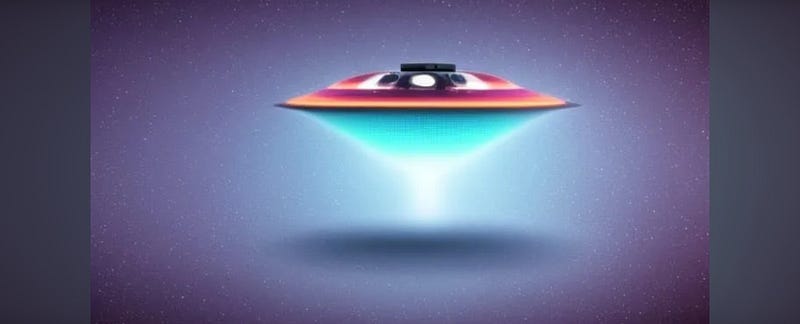The Paradigm Shift: Acknowledging UAP and Alien Intelligence
Written on
Chapter 1: The Changing Narrative
The fascination with Unidentified Aerial Phenomena (UAPs) is gaining traction, especially as academics begin to acknowledge sightings that challenge the long-standing skepticism. The shift away from the taboo surrounding UFOs suggests we may be witnessing the end of a paradigm, as credible voices in academia start to explore the possibility of non-human intelligence (NHI).
Science thrives on empirical data, and there is a growing body of evidence indicating that some UFOs may indeed be advanced technologies operated by non-human entities. For over seven decades, the scientific community has largely dismissed this idea, often responding harshly to those who dare to explore it. A notable example is the backlash against John E. Mack, whose research into alien abductions was met with hostility. This reaction parallels the current treatment of journalist Graham Hancock, who faces similar scorn for his unorthodox views. As new reports emerge, it appears that even among scientists, fear of ridicule has silenced many who have witnessed UAPs.

It's worth contemplating whether scientists, like all humans, are susceptible to fear—be it social anxiety, financial concerns, or fear of straying from accepted norms. This raises the question: can we trust scientists to present an unbiased view on any topic? Historically, investigative journalism has relied on the principle of "follow the money" to uncover wrongdoing, suggesting that financial motivations can shape scientific discourse as well.
This isn't an attack on scientists; rather, it’s a reminder that science should not function as a competition. The prevailing consensus surrounding UFOs and aliens has marginalized voices that challenge mainstream views, often labeling them as mentally unfit. John E. Mack’s background as a psychiatrist uniquely positioned him to address these biases.
Section 1.1: The Role of Data in Science
Science is fundamentally about data. It sometimes requires individuals or groups to challenge prevailing beliefs. The tale of Galileo serves as an important reminder that dismissing others for their interpretations is counterproductive. We must engage in open discussions about the data without resorting to ridicule or shaming.
Subsection 1.1.1: Acknowledging Diverse Perspectives
The scientific community must embrace the notion that differing experiences and perspectives are valid. Citing figures like William Blake or Rumi should remind us that wisdom can come from diverse sources. Even Robert Oppenheimer was not discredited for quoting the Bhagavad-Gita, illustrating that intellectual curiosity should not be stifled.
Chapter 2: The Emergence of New Evidence
Recent findings suggest that a significant number of academics have encountered UAPs. An academic survey published in Humanities and Social Sciences Communications indicated that approximately 20% of tenure-track faculty across 144 U.S. universities reported sightings of unidentified aerial phenomena. This survey also highlighted that most academics consider further research into UAPs essential.
The first video, "Araabmuzik - Turn the Tide," explores the theme of change and transformation, much like the evolving discourse on UAPs.
As the narrative shifts, it raises questions about the broader implications of acknowledging UAPs. Could Dean Radin's research into psi phenomena also hold merit? While he faces ridicule from some scientists, private conversations reveal that many academics share similar experiences that challenge their understanding.
The second video, "Turning the Tide," emphasizes the need for a paradigm shift in how we view these phenomena.
What if scientists, along with spiritual leaders, are merely human, and thus, their understanding is inherently limited? It is crucial to recognize that humans are not omniscient, and the pursuit of knowledge often leads to more questions than answers. This limitation is evident in various social agendas, where fixing one issue might inadvertently create another.
As we navigate this evolving landscape, we must consider the implications of free discourse. Avi Loeb's bravery in challenging norms serves as an inspiration, suggesting that it’s possible to pursue scientific inquiry despite facing ridicule. Reflecting on John E. Mack's experience, we might have bypassed the need for a debate about the reality of UFOs and instead focused on the possibility of extraterrestrial life.
In closing, the survey reveals that 19% of 1,460 academics reported witnessing UAPs, underscoring a significant shift in perception. While surveys represent scientific methods, interpretations can vary. It's intriguing that one can earn a PhD in theology, which involves studying non-human intelligence, yet discussing paranormal phenomena could lead to disavowal.
The question remains: Why is Jeffrey Mishlove the only individual with a recognized PhD in parapsychology? Economics doesn't seem to be the barrier, as public interest in UFOs could attract funding. If NASA discovered life on Mars today, we can be certain that the ensuing excitement would generate ample financial support for further exploration.
Ultimately, the pace of progress has been hindered, possibly to maintain control over economic resources. The potential discovery of UFOs and alternative energy sources poses a threat to existing power structures. Historically, figures like Nikola Tesla faced discrediting for advocating free energy, illustrating the tension between innovation and economic interests.
As we consider the implications of UAPs, we must confront our fears. With great power comes the potential for destruction. Are we ready to handle such advancements? The journey of human discovery often involves learning through experience, much like the lesson of touching a hot stove. However, we have the capacity for vicarious learning, and perhaps we can glean insights without the need for painful experiences—like watching episodes of Star Trek.
This reflection suggests we may have been too quick to judge the current situation regarding UAPs and their implications for humanity.